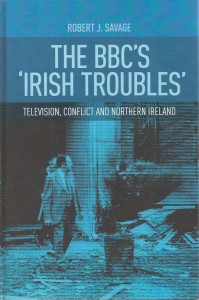THE BBC’S ‘IRISH TROUBLES’: TELEVISION, CONFLICT AND NORTHERN IRELAND
Published in Book Reviews, Issue 6 (November/December 2015), Reviews, Volume 23Reviewed by Niall Meehan
Head of the Journalism and Media Faculty in Griffith College, Dublin.

Robert Savage has written a richly detailed history of the BBC’s ‘Irish Troubles’, a story of how a sometimes-calculated self-censorship functioned before the British government made it official in 1988.
Savage explains how, during the 1960s, BBC Northern Ireland news was encouraged to ignore sectarianism. Inquisitive broadcasters from over the water were usually sent packing from the ‘Province’. At that time, however, the minority population received inspiration from network television pictures of African-American civil rights demonstrators and from the collapse of what remained of the British Empire. Their self-sustained revolt post-1968 against 50 years of discrimination was partly in response to indifference from Broadcasting House, as well as from Westminster.
Unwelcome attention descended on Northern Ireland after the BBC screened an October 1968 RTÉ film of the RUC attacking civil rights marchers in Derry. The book details a period of relative media freedom afterwards. It depicts Unionist Party leaders blinking un-familiarly in the media spotlight. Attempts to justify the unjustifiable—discrimination in housing and jobs, plus shameless gerrymandering—were sometimes accompanied by a plea that beneath the surface lay ‘complexity’, an explanation sunk deep in a unionist bog.
Ian Paisley’s Protestant (later Democratic) Unionist Party was on hand to articulate popular perceptions: Vatican-inspired papists, Dublin republicans, KGB communists and the occasional BBC homosexual were to blame for Ulster’s latest difficulty. Problems could be resolved by allowing the B Specials to crack heads and attack journalists. This was arresting but not (beyond unionism) convincing television. Increased scrutiny made these traditional solutions politically unacceptable.
The BBC’s public service ethos came into conflict with the post-1969 imperatives of British armed forces and locally recruited allies. The application of repressive colonial tactics was often stymied by media exposure. Policies of ‘Ulsterisation’, ‘normalisation’ and ‘criminalisation’ met with stories of security force criminality. Attempts to suppress nationalist alienation, represented by widespread tolerance of the IRA, required torture, brutality, shoot-to-kill operations and collusion with loyalist assassins. Normal it was not.
The BBC was not the only media organisation in the frame but, as Savage demonstrates, it attracted most flak. That was not merely because of its public service remit, important as that was. The British state was also fighting the Cold War against the Soviet Union, a conflict accompanied by propaganda about ‘British’ values: freedom of the individual, of speech and of an unfettered media.
At the centre of that ideological battle stood the BBC and its World Service. This image, and sometimes the reality, frustrated the application in ‘Ulster’ of an overt censorship like the Irish Republic’s Section 31 of the Broadcasting Act (about which, outside Ireland, who cared?).
The BBC expressed ‘British’ credibility that audiences took seriously. Frustrated officials resorted to relentless bullying. Savage describes Northern Ireland Secretary Roy Mason in his Belfast safari suit, the British Army GOC, the lord chief justice and the Queen’s University vice-chancellor openly intimidating BBC personnel in 1976. Threats of prosecution for filming the IRA were accompanied by political hysteria, some from within the BBC. Savage’s text gives voice to those hopping on and off the anti-BBC bandwagon. The pressures forced broadcasters to pull back but not, officially, enough.
During the 1980s Margaret Thatcher packed the BBC board of governors with right-wingers. In 1985 they banned a Real Lives documentary that featured Martin McGuinness, a controversy that began as a Sunday Times sting operation. Times owner Rupert Murdoch wished to eviscerate the BBC so as to enhance his own ambitions. As Savage explains, the Real Lives débâcle helped Thatcher’s associated desire to privatise everything short of the police and army. Outraged BBC staff engaged in industrial action, including a shutdown of the World Service.
Eventually, in 1988 Thatcher flung her rattle from the pram and instituted censorship that was directed also at IBA programming. Broadcast investigations of the SAS shooting dead three unarmed IRA members in Gibraltar were a major factor in the decision. Ironically, as Savage points out, whereas in the 1960s critical programmes about Northern Ireland were broadcast only in Britain, in 1998 a programme on the Gibraltar killings was limited to Northern Ireland. The gesture was insufficient to deflect Thatcher.
The fallout from censorship was no longer a factor in the Cold War, which ended in 1989. It was the story, however, early in 1994 in New York. The Guardian noted that ‘celebration’ of visiting Sinn Féin president Gerry Adams was due to his being ‘the man the Brits are trying to gag’. That became worldwide news after a CNN Larry King Live interview was not live in Europe and North Africa. CNN’s international satellite signal was downlinked to, and therefore censored in, Britain. Adams was broadcast a day late, with a US actor intoning his words. British censorship was difficult to hide.
Savage makes expert use of BBC correspondence, minutes and memos. He details attempts to impose a view of the conflict as that of an ordinary democracy under assault from mindless extremists. His tale of self-censorship and of resistance associates particular ‘Troubles’ events with difficulties arising from attempting to make programmes about them. Proposed programme treatments were often subject to public scrutiny that engaged attention during or after the fact. It would not be possible to write a history of RTÉ censorship in the same way. The weight of a stricter legal censorship over a much longer period meant that programmes were seldom proposed in the first place. Whereas RTÉ censorship was largely effective, in the BBC it was not, overall. Robert Savage’s indispensable book explains how internal and external filters often failed to prevent uncomfortable facts from appearing on tele-vision screens.
















